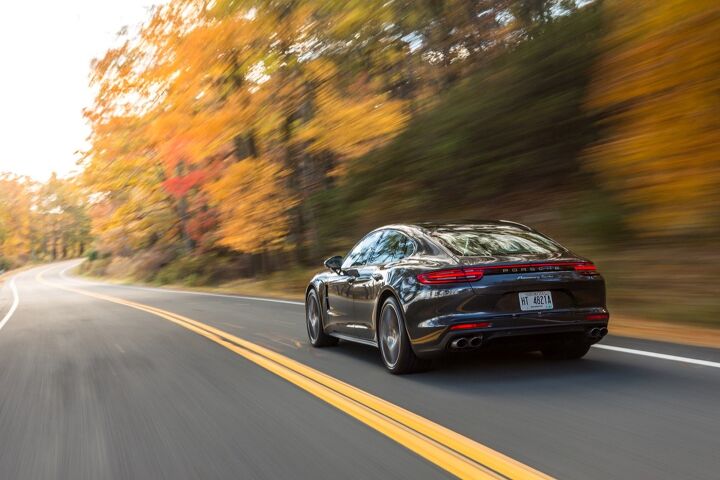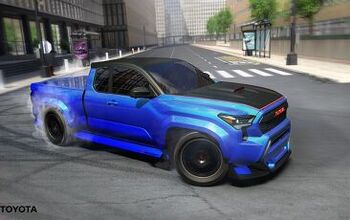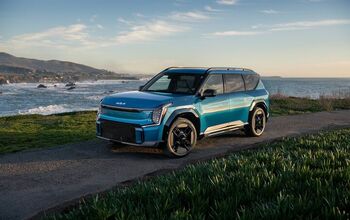After Falling Out of Love, Porsche's Diesel Divorce Is Now Complete

It always felt little odd whenever a diesel-powered Cayenne sidled up to you next to a stoplight. A Porsche that builds SUVs, we used to mull, and diesels, no less!
The public’s discomfort with a German sports car maker entering the utility vehicle field is long gone, and we can now say the same for Porsche’s short-lived dalliance with diesels. The automaker has stated it’s pulling its last remaining oil-burning models off the market.
A new Porsche is born, cleaner, but perhaps no purer.
According to Autocar, Porsche has discontinued the Macan S Diesel and Panamera 4S Diesel, both European models that were never touched by buyers across the pond. The Cayenne Diesel, which kicked off the brand’s affiliation with compression ignition in 2009, might disappear with the launch of the next-generation model later this year. Porsche tentatively claimed it would field a diesel variant, but hasn’t confirmed a launch date.
In North America, the Cayenne Diesel met an earlier fate during the Volkswagen emissions scandal. In that uber-expensive brouhaha, late-model 3.0-liter TDI models like the Cayenne found themselves in the EPA’s crosshairs. No North American VW Group vehicle carries a diesel anymore.
Porsche was never an enthusiastic adopter of the technology, choosing to borrow engines from the VW Group parts bin rather than develop its own. With diesel sales declining in Europe (volume was down 7.9 percent last year) and governments and regulators howling for cleaner air in cities, diesel’s European tombstone is already in the process of being etched.
The company’s comments to Autocar suggest that the continent’s new testing regimen is behind the dropping of the two models. Porsche doesn’t want to sink any money into bringing diesel engines into compliance with updated emissions standards.
Last year, Porsche CEO Oliver Blume said diesel sales made up just 15 percent of the brand’s volume, and the automaker was spivoting its R&D spending towards electrification. In his view, diesel just wasn’t that important to the company’s long-term fortunes.
In a recent statement on Porsche’s website, R&D board member Michael Steiner laid out the company’s electrification plans while touting the all-electric Mission E sedan, scheduled to enter production by the end of 2019.
“During an initial stage, we will offer electrically powered versions of existing model lines,” Steiner explained. “In addition, however, work will continue on the development of other purely electric vehicles following the example of the Mission E. To speed up progress in this area, Porsche has joined forces with Audi to set up the Premium Platform Electric. Teams from both brands will work together to lay the foundations for future e-vehicles. At the same time, Porsche is forging ahead with hybridisation of the drivetrain.”
Already, there’s been a sharp uptick in European interest for Porsche’s plug-in E-Hybrid lineup. Blame juicy tax incentives for models’ popularity. If governments plan to punish diesel car use, why wouldn’t Porsche pursue the technology that governments reward?
[Images: Porsche]

More by Steph Willems
Latest Car Reviews
Read moreLatest Product Reviews
Read moreRecent Comments
- Duke Woolworth Weight 4800# as I recall.
- Kwik_Shift_Pro4X '19 Nissan Frontier @78000 miles has been oil changes ( eng/ diffs/ tranny/ transfer). Still on original brakes and second set of tires.
- ChristianWimmer I have a 2018 Mercedes A250 with almost 80,000 km on the clock and a vintage ‘89 Mercedes 500SL R129 with almost 300,000 km.The A250 has had zero issues but the yearly servicing costs are typically expensive from this brand - as expected. Basic yearly service costs around 400 Euros whereas a more comprehensive servicing with new brake pads, spark plugs plus TÜV etc. is in the 1000+ Euro region.The 500SL servicing costs were expensive when it was serviced at a Benz dealer, but they won’t touch this classic anymore. I have it serviced by a mechanic from another Benz dealership who also owns an R129 300SL-24 and he’ll do basic maintenance on it for a mere 150 Euros. I only drive the 500SL about 2000 km a year so running costs are low although the fuel costs are insane here. The 500SL has had two previous owners with full service history. It’s been a reliable car according to the records. The roof folding mechanism needs so adjusting and oiling from time to time but that’s normal.
- Theflyersfan I wonder how many people recalled these after watching EuroCrash. There's someone one street over that has a similar yellow one of these, and you can tell he loves that car. It was just a tough sell - too expensive, way too heavy, zero passenger space, limited cargo bed, but for a chunk of the population, looked awesome. This was always meant to be a one and done car. Hopefully some are still running 20 years from now so we have a "remember when?" moment with them.
- Lorenzo A friend bought one of these new. Six months later he traded it in for a Chrysler PT Cruiser. He already had a 1998 Corvette, so I thought he just wanted more passenger space. It turned out someone broke into the SSR and stole $1500 of tools, without even breaking the lock. He figured nobody breaks into a PT Cruiser, but he had a custom trunk lock installed.



































Comments
Join the conversation
According to Porsche's web site, MSRP for a 2018 Cayman S with no options is $67,700 plus $1,050 for delivery, etc. In 2007, I looked at the Cayman for my retirement present to myself. If I remember correctly, base price for an S was about $60k. Base price for a non-S Cayman was $50k. It is now $55k which isn't bad for 10 years' inflation.
An SUV without a diesel option in Europe? That will negatively affect sales, especially in large SUVs like the Macan. Based on visual observation, most Cayenne and Macan SUVs that I have seen are diesel-powered.